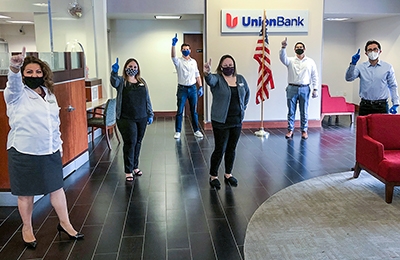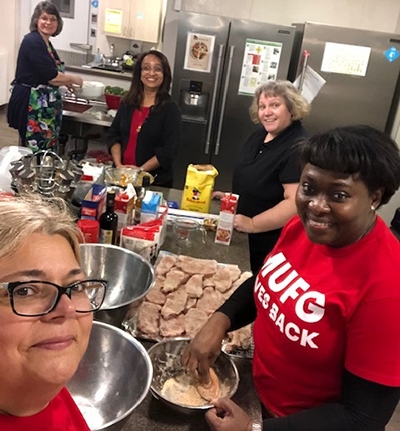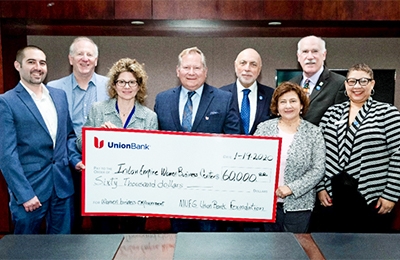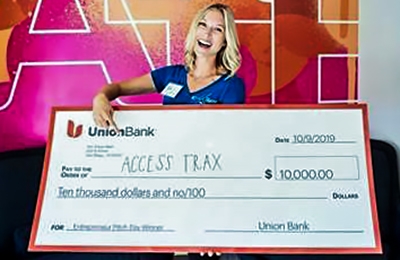Our Approach
Our commitment to our communities runs deep and throughout all of MUFG. The Board of Directors, the Executive Committee of the Americas, and a community advisory board work through the Community Reinvestment Act (CRA)Commitment and Corporate Social Responsibility of the Americas (CSRA) group to lead our efforts in this space in the Americas. In turn, the CRA Officer and CSRA group coordinate with the CRA Committee, our lending team and branch staff, and our Compliance Group, as well as community advocacy groups and partners.
Like all of our work, our community reinvestment efforts are based on the principles of sustainability. We recognize that the health of the bank is interconnected to the health of our communities, and therefore we endeavor to promote financial prosperity and sociocultural equity across the regions we serve. To promote financial inclusion and alleviate barriers related to finance, we partner with small businesses and CDFIs (Community Development Financial Institutions) to drive growth at all levels of development. We also offer financial education opportunities for our clients, and work to improve access to financial services for low- and moderate-income community members. Much of this work is facilitated through community partnerships, colleague community engagement, and local initiatives, specifically focusing on addressing the urban housing crisis affecting many communities. We also give back through the bank’s charitable contributions program, including grants made through the Union Bank Foundation as well as donations and sponsorships made directly by the bank.

Toward the end of our fiscal year (April 1, 2019 to March 31, 2020) the COVID-19 pandemic had taken hold. As a financial institution, we quickly adapted and were on the front lines supporting our clients with un-interrupted access to financial services in addition to guidance, resources, and tools. Community reinvestment became more critical than ever, and we knew we were in a situation to provide a lifeline to our clients, communities, and colleagues. This experience has taught us lessons in client and community support that we aim to continue and strengthen through our work.
Looking forward, we will continue to lead in key areas important to the bank: social and racial equity, financial education, affordable housing, and environmental stewardship.
2020 Community Advisory Board Members
Thomas P. FitzGibbon, Jr.
Board Director, Neighborhood Housing Services of Chicago
Board Director, Chicago Community Loan Fund
Susan Howard
Western District Community Affairs Officer (Retired)
Office of the Comptroller of the Currency
Vivienne Lee
Regional Director
Southern California – Roberts Enterprise Development Fund (REDF)
David Lizarraga
Chairman & Founder
TELACU Education Foundation
Kristen Ollendorff
Chief Credit Officer
Clearinghouse CDFI
Beth Sirull
President & CEO
Jewish Community Foundation of San Diego
Claudia Viek
Founder
Invest in Women Entrepreneurs Initiative
Robert Villarreal
EVP & President
CDC Small Business Finance
Bankers Small Business CDC of CA
Our Progress on our 2016-2020 Community Service Action Plan Goals and Commitments
In 2016, we made a series of specific, measurable goals and commitments for community-related investments and activities. These goals were carefully selected to address emerging community needs in the current dynamic environment. From January 1, 2019 through December 31, 2019, Union Bank committed the following our 5-year Community Service Action Plan
- To support economic development in low to moderate-income communities
$49 million - Philanthropic grants and investments
$17.6 million - Environmental financing and investment
$9.7 billion1 - Community Reinvestment Act (CRA) Reportable small business lending
$1.1 billion

- Multi-family affordable housing lending
$830.7 million - Percentage of total bank spending to go to Diverse Business Enterprises
14.3% - Community Development Financial Institution Loans
$19.5 million - CRA-qualified mortgage spending
$976.1 million
1 note: this data applies for FY2019
Governance
We are proud of our long-standing record of responsible banking and strive every day to improve our performance as a responsible partner and neighbor.
We govern ourselves based on five tenets of responsible banking:
- Responsible Lending: Maintain high lending standards; never offer subprime loans; and focus on small & diverse business lending
- Financial Management: Maintain a strong balance sheet and credit ratings and cultivate a culture of transparency
- Support of Communities: Offer a helping hand for homeowners; focus on affordable housing; encourage colleague volunteerism
- Colleagues: Commit to inclusion and diversity from top to bottom; encourage supplier diversity
- Products & Practices: Ensure fair pricing with full disclosure; migrate individuals into mainstream banking; embrace environmental sustainability
Our commitment to responsible banking practices guides our community reinvestment efforts, from community lending to strengthening small and minority-owned businesses.
Community Lending
The Union Bank Small Business, Affordable Housing, Consumer Lending, Mortgage Assistance, and Branch teams are all involved in our community lending efforts, ensuring a cohesive strategy that extends throughout the organization. In the past year, Union Bank made over $1.2 million in community development loans, focusing on affordable housing, revitalizing neighborhoods, stimulating job creation, and opening avenues of economic opportunity for the community.
The CSRA Investment & Lending group’s mission is to support community economic development through sustainable lending and investment practices that deliver double bottom-line benefit to the community and the bank. They aim to ensure a healthy and stable portfolio, while minimizing risk of capital and maximizing return on mission-driven investments.
As a community lender, Union Bank has an opportunity to offer services that will fit the needs of our community in an equitable manner. This means keeping in mind the needs of small businesses and low- and moderate-income communities when we develop these services. In order to find out how we can be the best partners for our West Coast neighbors, we employ a ‘boots on the ground’ approach. By actively working with and speaking with the community, we are able to better evaluate the priorities of our neighbors, what our peers are doing, and where there might be unmet needs. This is the process we undertake for all areas of lending, including affordable housing.
We earned an Outstanding Community Reinvestment Act rating from our regulator, the Office of the Comptroller of the Currency. As we continue to make progress in 2020, we aim to maintain that rating, and exceed the standards set by the federal regulation.

Colleague Volunteering
Union Bank provides each of its full-time colleagues with up to three days of paid time off to give back to our communities. We engage our colleagues in volunteer opportunities that support individuals, families, and communities, including small businesses.
Our colleagues logged more than 64,000 hours of volunteerism to various causes and organizations throughout our many regions. This speaks directly to our colleagues’ shared commitment to serving in their local communities.
Senior leaders played an important role in prioritizing and supporting community development service in low and moderate-income communities where we do business. Examples of activities supporting our vision include:
- providing financial education, individual or small business development
- participation at a career day speaker series
- providing services reflecting areas of expertise such as human resources, information technology, and legal services
- nonprofit board service
To enhance the colleague contributions, whether it’s the gift of time and talents or monetary, Union Bank also offers a matching-gift program whereby the bank matches donations dollar for dollar up to $2,500 per colleague.
When the pandemic took hold in early 2020, the Foundation quickly mobilized and adapted the bank’s volunteer program to an all-virtual platform, allowing colleagues to continue to volunteer remotely.

Strengthening Small and Minority-Owned Businesses
Much of the success of the communities we serve is a direct result of the support that small businesses provide to the economy. Through its Supplier Diversity Program, Union Bank is proud to support minority-owned suppliers. Our goal is simple: to increase the number of Diverse Business Enterprises (DBEs) from which we buy products and services. We want to help diverse businesses do business with us.
One of the most significant factors in the success of Union Bank is our ability to facilitate the stabilization and growth of DBEs in our communities. Supplier Diversity provides DBE suppliers with mentoring, networking opportunities, and scholarships for entrepreneurial training. We teach diverse business owners how to navigate the corporate contracting and procurement process and match their products and services with our company’s needs. In 2019, more than $270,000,000 was allocated for products and services provided by DBE suppliers.
In addition, through its philanthropic efforts, Union Bank contributed $427,000 to a total of 25 business development organizations such as Women’s Business Enterprise Council and the Veterans in Business Network among many others.
“We provide the resources for our Supplier Diversity & Development team to mentor and guide potential future vendors to ultimately provide products and services to the Bank. Our aim is to produce not just responsive suppliers but engaged partners.” – Richard Chacon, Head of Supplier Diversity at Union Bank.
Union Bank is one of only a handful of banks in the country to have a special purpose credit program under the Equal Credit Opportunity Act. Our Business Diversity Lending Program is designed to empower woman-, minority- and veteran-owned businesses. Through the program, we provide credit and financing to minority groups to help our communities thrive. We also work with New Economics for Women, a nonprofit designed to create economic mobility for women, particularly Latinas, through wealth creation, housing, education and more.
Driving Growth Through the Technical Resource and Assistance Center Program
The MUFG Union Bank Foundation made key investments in small business technical assistance. These investments are intended to drive growth in our communities and offer assistance to small business owners and microenterprises who otherwise might not receive it.

Entrepreneurship is a key factor in a thriving economy, and we are committed to supporting enterprising men and women throughout our footprint. And we are also committed to collaborations that bring together public, private and non-profit partners to leverage expertise and resources. This is why we established the Technical Resource Assistance Center (TRAC) initiative and decided to partner with CONNECT ALL @ The Jacobs Center (CAJC), an organization that focuses on early-stage entrepreneurship and accelerating neighborhood business growth. Launched in 2019, Union Bank helped leverage City of San Diego Funding committed to support it by contributing $100,000 per year for three years. The opportunity is geared toward diverse and financially disadvantaged founders of San Diego-based startups that are in the early stages and are poised for growth, as well as to create jobs for residents with low to moderate incomes. Participants in the six-month program receive mentorship and weekly workshops focused on growing a sustainable business. A fully equipped co-working space is dedicated to the program but the workshops have been done remotely during the COVID-19 pandemic.
In October 2019, Union Bank co-presented the inaugural entrepreneur pitch competition at CONNECT ALL @ the Jacobs Center (CAJC). The program invited participating entrepreneurs who had spent the previous six months in a business development program to pitch their companies to a judging panel. The winner of the competition was Access Trax, which creates portable wheelchair access mats, taking home $10,000 to help grow the business.

In February of 2020, Union Bank also announced a two-year $200,000 grant to the Women’s Social Entrepreneurship Center (WSEC) in East Oakland, enabling it to grow and expand its program serving women facing the greatest barriers to entrepreneurship. The primary populations served are formerly incarcerated and immigrant women of color seeking self-sufficiency and economic mobility through business ownership. This effort is integrated with the City of Oakland’s Economic Development strategy which is focused on ensuring that residents across Oakland, including low-income residents and people of color, have equal access to small business and employment opportunities.
In March 2020, Union Bank Foundation launched the Women’s Entrepreneurship Capacity Building, Advocacy Support, Nurturing Growth (WE CAN) Initiative. The two-year $500,000 women’s entrepreneurship and small business effort will help build capacity for under-resourced Women Small Business Centers (WBCs) in California.
California has the greatest number of women business owners in the nation at 1.5 million. Women’s Small Business Centers are critically important to building a strong pipeline of women-owned businesses, which are key to the economic vitality of California.
WE CAN focuses on three key pillars: leadership, training and advocacy. In partnership with the Women’s Business Network and the California’s statewide microenterprise association (CAMEO), WE CAN supports the women’s small business ecosystem so that women-owned companies can grow and prosper. The fund provides resources to the following organizations in California:
- California Capital Women’s Business Center in Sacramento
- San Diego Women’s Business Center in San Diego
- Mission Community Services Corporation Women’s Business Center in Monterey
- Inland Empire Women’s Business Center in Riverside
- Renaissance Entrepreneurship Center in San Francisco
- Asian Pacific Islander Small Business Program Women’s Business Center in Los Angeles.

